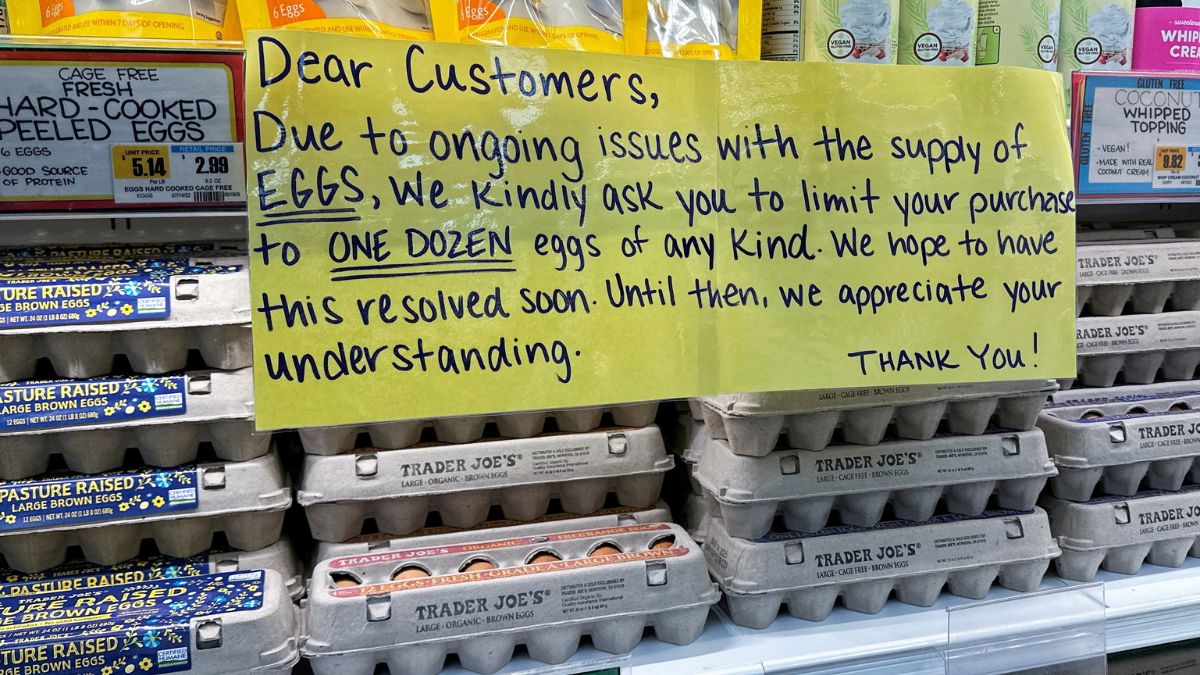The United States is facing a severe egg shortage due to a widespread avian flu outbreak, prompting the federal government to implement a $1 billion initiative to stabilise the supply and curb skyrocketing prices.
The plan, led by the US Department of Agriculture (USDA), includes increased egg imports, biosecurity measures, financial relief for farmers, and potential vaccination programmes.
How avian flu has impacted US egg supply
The H5N1 strain of avian influenza, which first surfaced in the US in late 2021, has decimated poultry farms across the country.
Over 140 million egg-laying birds have died since 2022, including 17 million in just the last two months of 2023. The crisis worsened in early 2024 when the disease led to the death of one Louisiana resident.
As a result, egg prices have soared . The average price of a dozen large Grade A eggs reached an all-time high of $4.95 in January 2024, a 15 per cent increase from the previous month, according to the US Bureau of Labor Statistics.
In some areas, prices have climbed to $6, $7, or even $10 per dozen. Retailers like Costco and Trader Joe’s have resorted to limiting egg purchases per customer, while restaurants such as Waffle House have added surcharges for eggs.
“This matters for American families because eggs are a healthy, accessible, and generally affordable source of protein,” said US Agriculture Secretary Brooke Rollins in an opinion piece for The Wall Street Journal.
What the US is doing to address the crisis
To mitigate the egg shortage, the Trump administration has announced a multifaceted approach, including:
Increased egg imports
The USDA will ramp up egg imports from foreign producers, particularly Turkey, which has agreed to send 420 million eggs to the US this year — nearly six times its usual annual supply. By July alone, Turkey is expected to deliver 240 million eggs.
“We already have a couple of countries interested in exporting eggs to the US,” said USDA Chief of Staff Kailee Tkacz Buller.
However, experts caution that these imports may not be sufficient to offset the ongoing production losses.
“While this is enough to offset some production losses, it won’t provide much support if HPAI (avian flu) continues at its current pace,” CNN quoted Bernt Nelson, an economist at the American Farm Bureau Federation.
Biosecurity and Disease prevention
The USDA is allocating $500 million for a new Wildlife Biosecurity Assessments programme aimed at limiting contamination in commercial egg-laying farms. This initiative includes free consultations for all commercial farms and funding to cover up to 75 per cent of biosecurity improvement costs.
Additionally, the government will review regulations such as California’s Proposition 12, which sets minimum space requirements for egg-laying hens.
Rollins criticised the law, stating that it contributed to California’s average egg price reaching $9.68 per dozen.
Financial relief for farmers
The USDA will provide $400 million in direct financial assistance to farmers whose flocks have been affected by avian flu. This funding will also expedite approvals for restarting poultry operations after an outbreak.
“American farmers need relief, and American consumers need affordable food,” Rollins said in a press release. “To every family struggling to buy eggs: We hear you, we’re fighting for you, and help is on the way.”
Vaccine development and research
The USDA will invest $100 million in research and development for avian flu vaccines and other treatments. The agency has already issued a conditional license for an avian flu vaccine developed by Zoetis, which has been deemed safe and effective based on serology data.
However, mass vaccinations remain a contentious issue. While many egg producers support vaccination, poultry exporters fear it could disrupt international trade.
Vaccinating birds could lead to the perception that the US has an endemic disease problem, making it harder to detect infections and potentially deterring foreign buyers of American poultry.
White House and Economic Council strategy
The White House has also outlined plans to combat the avian flu crisis through biosecurity, medication, and perimeter controls. Kevin Hassett, Director of the White House Economic Council, said on CBS’ Face the Nation, “Having a smart perimeter is what we’re working on, and we’re finalising ideas with the best scientists in government.
If this had been done a year ago, egg prices would be much better than they are now.”
Will it work?
Despite the USDA’s billion-dollar plan, the egg shortage remains an ongoing concern. Experts predict that the price of eggs could rise another 20 per cent this year due to continued production challenges.
The US produces over 7.5 billion dozen eggs annually, but with avian flu still spreading, meeting domestic demand remains difficult. Some scientists argue that more funding is needed for virus surveillance and research.
However, recent staffing cuts at agencies like the USDA and CDC have raised concerns about the country’s ability to manage the crisis effectively.
Rebecca Carriere Christofferson, an associate professor at LSU’s School of Veterinary Medicine, warned that more chaos in the system could further delay relief efforts. “If ever there was a time when it was absolutely critical to not infuse more chaos into the system, this is it,” she told CNN.
For now, consumers can expect continued price fluctuations as the US government and egg producers work to stabilise the market.
With inputs from agencies
)